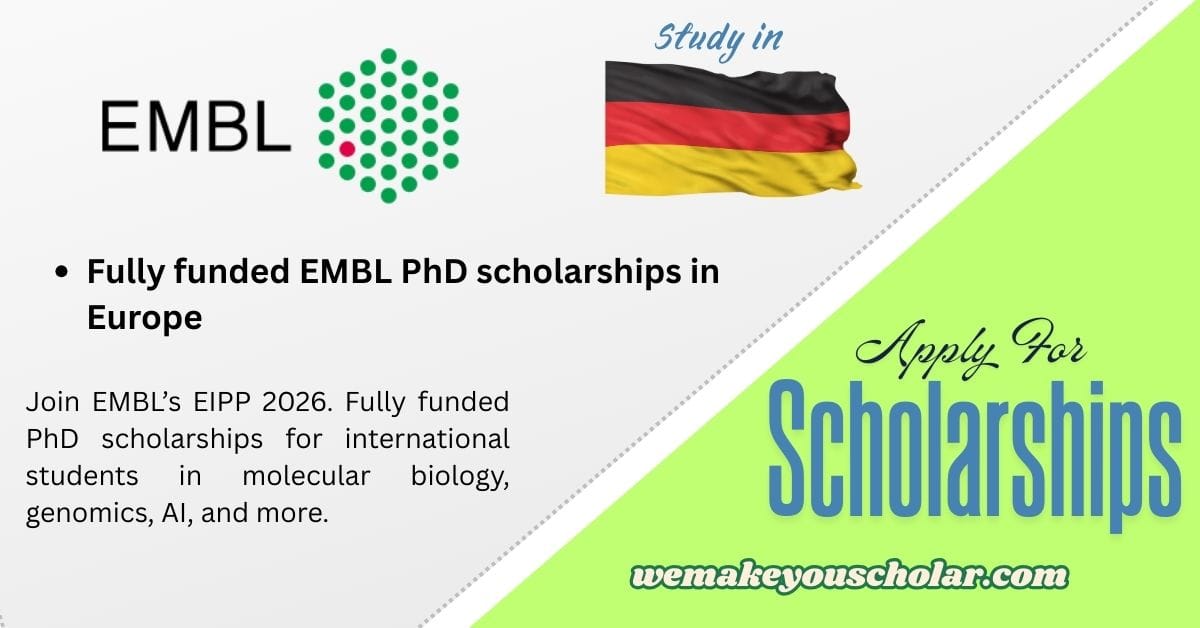EMBL International PhD Programme 2026 – Fully Funded Doctoral Opportunities in Europe
Since its establishment in 1983, the European Molecular Biology Laboratory (EMBL) has stood at the forefront of scientific discovery and graduate education. Through the EMBL International PhD Programme (EIPP), the institute offers one of the most competitive and rewarding doctoral training opportunities in Europe. Every year, EMBL invites outstanding students from across the globe to join its network of six research sites, offering a structured yet flexible environment where young scientists can grow into leaders of tomorrow.
The 2026 Winter Recruitment Call is now open, with fully funded PhD positions available. Successful applicants will begin their doctoral research no later than October 2026, and the deadline to apply is 13 October 2025. This recruitment round is expected to attract a diverse pool of applicants who are eager to explore molecular life sciences and interdisciplinary research at an institution recognized as a role model worldwide.
About EMBL: A European Hub of Scientific Excellence
The European Molecular Biology Laboratory is not just a single institute—it is a pan-European organization with six sites:
Heidelberg, Germany (Headquarters) – the central hub for molecular biology and cutting-edge technology platforms.
Barcelona, Spain – specializing in tissue biology and modeling.
Grenoble, France – known for structural biology and high-end imaging techniques.
Hamburg, Germany – home to large-scale facilities for structural and molecular research.
Hinxton, UK (near Cambridge) – focused on bioinformatics and genomics, also known for the European Bioinformatics Institute (EMBL-EBI).
Rome, Italy – dedicated to epigenetics and neurobiology research.
This distributed model allows EMBL students to experience truly international collaboration, engaging with scientists, technologies, and methodologies across borders. EMBL’s commitment to open science, research integrity, and diversity makes it not just a research institution but a living community of ideas and people.
What Makes the EIPP Unique?
The EMBL International PhD Programme (EIPP) has been praised as a model for graduate training, influencing PhD education at numerous institutions around the world. Unlike conventional doctoral training, EMBL provides:
Early independence – Students are encouraged to develop their own research directions within EMBL’s dynamic research groups.
Strong mentoring – Each student is supported by experienced supervisors, thesis advisory committees, and peer networks.
Interdisciplinary exposure – Projects span biology, chemistry, physics, mathematics, computer science, and engineering.
Collaborative culture – EMBL thrives on teamwork across sites, making it a hub for cross-border, cross-discipline scientific progress.
Creative freedom – Doctoral students are treated as independent researchers, not assistants, giving them ownership of their projects.
Research Areas at EMBL
PhD candidates at EMBL join research groups that tackle some of the most pressing scientific questions. The diversity of research themes ensures that applicants from many academic backgrounds can find a niche:
Molecular and Cell Biology – understanding how cells grow, divide, and respond to their environments.
Developmental Biology – investigating how organisms develop from single cells into complex life forms.
Structural Biology and Biophysics – applying advanced imaging and physics-based approaches to understand biological structures.
Genomics and Proteomics – mapping genetic and protein-level changes that shape health and disease.
Systems and Computational Biology – using mathematical and computational models to explain biological systems.
Neuroscience – exploring the molecular basis of brain function, memory, and neurodegenerative disorders.
Microbiology and Virology – studying microbes, viruses, and their interactions with hosts.
Bioinformatics and Artificial Intelligence – developing tools for big data analysis in genomics and biomedical research.
Evolutionary Biology and Ecology – uncovering the principles that govern biodiversity and adaptation.
Many projects cut across disciplines, for example, combining AI-driven data analysis with molecular imaging, or integrating genomics with structural biology. This approach ensures EMBL students are always at the forefront of scientific innovation.
Who Can Apply? Candidate Profile for 2026 Entry
The EIPP is open to applicants from anywhere in the world, making it one of the most diverse doctoral programmes in Europe. To be considered:
Applicants must hold a university degree that qualifies for PhD study in the awarding country (typically a Master’s, though exceptional Bachelor’s students may be eligible).
Academic backgrounds can include:
Biology and Biomedicine
Chemistry
Physics
Computer Science
Mathematics
Engineering
Molecular Medicine
Candidates should demonstrate:
Strong academic performance
Scientific curiosity and creativity
Potential for independent research
Proficiency in English (the working language of EMBL)
Funding and Benefits: Fully Supported PhD Training
One of the biggest advantages of the EMBL PhD programme is its comprehensive funding package, ensuring students can focus entirely on research without financial stress. Benefits include:
Fully funded studentships covering tuition, fees, and living expenses.
Generous stipends, benchmarked against international standards (competitive with top European research institutions).
Social security and health insurance included.
Travel allowances, enabling students to attend conferences, training courses, and collaborations.
Access to world-class facilities, such as cryo-electron microscopy, sequencing platforms, advanced computing, and imaging technologies.
Professional development – transferable skills workshops, leadership training, and career planning.
By offering this package, EMBL ensures its doctoral students thrive both academically and personally during their training.
Why Choose EMBL for Your PhD?
Many universities in Europe offer PhD opportunities, but EMBL stands out for several reasons:
International reputation – EMBL-trained scientists are highly sought after worldwide.
Collaborative culture – research groups cut across borders and disciplines.
Diverse community – over 100 nationalities are represented.
Career outcomes – alumni hold prestigious positions in academia, biotech, pharma, and science policy.
Commitment to integrity – EMBL is a signatory of DORA, ensuring fair and transparent evaluation practices.
Student life – EMBL fosters a vibrant student community with cultural events, networking, and peer support.
The combination of scientific excellence, inclusivity, and holistic training makes EMBL a unique environment for doctoral study.
Application Process: Step by Step
To apply for the EIPP 2026 Winter Recruitment, candidates must complete an online application via the EMBL recruitment portal. The process involves:
Online Application Submission – fill out personal details, academic history, and research interests.
Motivational Statement – clearly explain your research interests, reasons for choosing EMBL, and career aspirations.
Reference Letters – provide contact details of at least two referees, who will submit confidential letters.
Transcripts and Certificates – upload degree certificates and academic transcripts.
Preference Selection – indicate preferred EMBL sites or research groups.
Timeline:
Application deadline: 13 October 2025
Interview rounds: January–February 2026 (virtual or onsite)
Start of PhD: No later than October 2026
Life as a PhD Student at EMBL
Doctoral training at EMBL is not just about lab work—it is a holistic experience:
Community life – Students live in multicultural environments, fostering friendships across the globe.
Training courses – EMBL organizes internal workshops, summer schools, and specialized courses.
Conferences and networking – Students attend international scientific events, presenting their work to leading experts.
Alumni network – Graduates become part of a global network of EMBL alumni in science, industry, and policy.
This supportive ecosystem ensures EMBL students are not only skilled researchers but also confident professionals prepared for diverse career paths.
Frequently Asked Questions (FAQs)
1. Do I need to pay tuition fees at EMBL?
No. EMBL PhD positions are fully funded, and tuition fees are waived.
2. Is the programme open to non-European students?
Yes. The EMBL PhD programme welcomes candidates from all nationalities.
3. What level of English is required?
Fluency in English is essential, as it is the working language across EMBL sites.
4. Can Bachelor’s degree holders apply?
Yes, in some cases. Eligibility depends on whether the degree qualifies for PhD study in the awarding country.
5. How competitive is the admission process?
Extremely competitive. EMBL receives thousands of applications each year, and only the most outstanding candidates are selected.
6. Where will I be based if selected?
You can be placed at any of EMBL’s six sites, depending on your project and supervisor.
Final Thoughts: A Career-Defining Opportunity
The EMBL International PhD Programme 2026 offers more than a doctorate—it provides a foundation for lifelong success in science. With its world-class facilities, supportive training environment, and commitment to diversity, EMBL stands as a beacon of excellence in molecular life sciences.
For motivated students eager to shape the future of science, this is a unique chance to begin a fully funded journey in one of the most prestigious doctoral programmes in the world.
👉 To apply, visit the official EMBL PhD Programme page.




